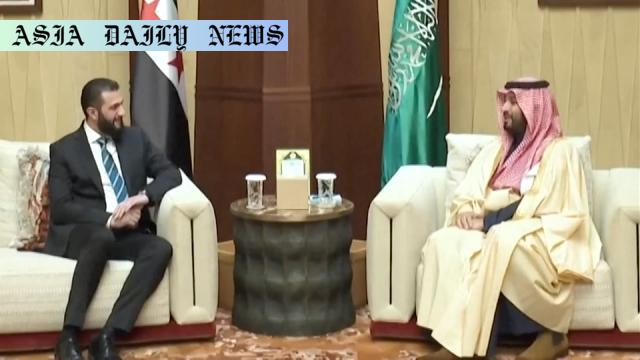Syria: Ahmed al-Sharaa’s meeting with Saudi Arabia’s crown prince signifies efforts to bolster post-conflict recovery and alliances.
- Interim President Ahmed al-Sharaa met Saudi Arabia’s Crown Prince in Riyadh for extensive discussions on Syria’s future.
- Sharaa identified Saudi Arabia’s genuine eagerness to aid Syria’s rebuilding post-civil war.
- This marks Sharaa’s first foreign visit since assuming office in January.
- Sharaa is working to foster ties with wealthy Gulf nations for aiding the nation’s recovery.
- The Hayat Tahrir al-Sham group is leading Syria’s transitional government after the fall of Bashar al-Assad.

A Historic Diplomatic Meeting in Riyadh
Syria took a significant step towards strengthening its international relations during a meeting between Interim President Ahmed al-Sharaa and Saudi Crown Prince Mohammed bin Salman in Riyadh. The talks, reportedly extensive, focused on a variety of issues pivotal to Syria’s recovery after years of civil war. According to Syria’s presidential office, Sharaa was met with a genuine display of Saudi support and a willingness to assist in rebuilding the nation ravaged by years of conflict and instability.
Key Context Behind the Meeting
This meeting holds historical significance as it marks Sharaa’s first foreign visit since assuming the presidency in January. Saudi Arabia, a leading Gulf power, has historically shown interest in stabilizing the region, and this meeting highlights its commitment to fostering a constructive relationship with Syria. For Syria, this is an opportunity to rebuild alliances and secure assistance from wealthier Gulf nations, at a time when economic and infrastructural reconstruction is paramount.
Strengthening Regional Networks
Analysts suggest that the meeting also aligns with ongoing efforts by Sharaa’s transitional government to realign Syria’s political and economic strategies with regional partners. This step follows Sharaa’s recent meeting with Qatar’s Amir Sheikh Tamim bin Hamad Al Thani, indicating a broader strategy to boost ties with Gulf countries. With the backing of nations such as Qatar and Saudi Arabia, Syria holds potential to tap into financial resources and diplomatic goodwill necessary for long-term stability.
Transitioning Leadership Under Hayat Tahrir al-Sham
The current transitional government in Syria, led by the Hayat Tahrir al-Sham group, has played an instrumental role in reshaping the nation after the ousting of former President Bashar al-Assad. While the group’s leadership may still garner mixed global perceptions, it is evident that this transitional phase is an opportunity for Syria to restore both its domestic and international standing. This meeting may also dispel some skepticism surrounding the group’s intentions for Syria’s future.
Implications for the Region
The outcome of Sharaa’s visit to Riyadh will likely influence the dynamics of Middle Eastern geopolitics. If Saudi Arabia proceeds to offer substantial aid or investment to Syria, this could mark a turning point in the country’s rebuilding process, enabling infrastructure development and economic revival. Additionally, fostering ties with Gulf nations may offer Syria stronger leverage in overcoming the remnants of international isolation it faced during the years of civil unrest.
Future Prospects
As Sharaa continues to build bridges between Syria and its Gulf neighbors, it becomes clear that regional alliances are key to the nation’s recovery. The talks with Saudi Arabia may pave the way for future strategic partnerships, not only in financial aid but also in infrastructural and sociopolitical reforms. As such developments unfold, it remains to be seen how Syria will navigate its long and complex journey towards peace, stability, and prosperity.



Commentary
The Importance of Syria-Saudi Relations
The recent meeting between Syria’s interim president Ahmed al-Sharaa and Saudi Arabia’s Crown Prince Mohammed bin Salman carries profound geopolitical and humanitarian implications. For Syria, a nation ravaged by years of civil war and societal collapse, fostering robust diplomatic and economic ties with Gulf nations like Saudi Arabia represents a beacon of hope. This crucial engagement reflects Syria’s resolve to emerge from the ashes of its turbulent past, much of which has been marked by international isolation and domestic turmoil.
Saudi Arabia’s Role in Syria’s Recovery
Saudi Arabia has long played a powerful role in shaping the Middle East’s political and economic frameworks. By signaling a genuine willingness to assist Syria, the Kingdom offers a unique opportunity for collaboration. Saudi financial capacity and political influence could accelerate Syria’s rebuilding efforts, not just in terms of infrastructure but also in fostering economic revival and social cohesion. The Gulf region’s solidarity in addressing Syria’s plight could set a new standard for regional cooperation.
Sharaa’s Diplomatic Strategy
It is interesting to observe Sharaa’s diplomatic approach in engaging with prominent Gulf nations such as Saudi Arabia and Qatar. By positioning Syria as a collaborative partner rather than a state in perpetual need, Sharaa’s administration showcases strategic foresight. These engagements could attract not only financial aid but also instill confidence among international observers, demonstrating Syria’s commitment to stability and growth under its transitional government.
Conclusion
The Riyadh meeting is more than just a diplomatic formality; it is a signal of renewed partnership and hope for Syria’s beleaguered populace. While challenges remain, the unfolding diplomatic efforts signify a step in the right direction. With strong regional support, Syria might finally begin its arduous journey toward reconstruction and healing, reaffirming the resilience of its people and leadership.